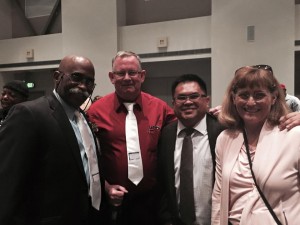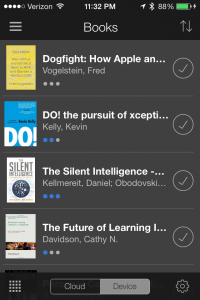 I attended a campus event to celebrate the retirement of UCSB Vice Chancellor for Student Affairs Dr. Michael Young yesterday, January 23, 2015. Dr. Young will retire at the end of this month after 25 years as the VC for Student Affairs starting in 1990. It was an event attended by former and current students, staff and faculty, campus administrators, and local politicians. Throughout the three-hour event, speakers on stage shared Dr. Young’s accomplishments, the differences he made to the community, and most importantly, the differences he made to them as human beings. During the 24 years I’ve known Dr. Young, he has had a profound impact on me, greater than he will realize, as a student, professional, and human being. As I shared in this post dedicated to Dr. Young as my mentor/role model, I admired how he led, his integrity, and how he made others feel special. Even as a student new to UCSB, I saw Dr. Young as my possibility model. Dr. Young embodies the possibility that I, too, a person of color (PoC), can hold a leadership position at the highest level of the university. And, I can do so without compromising my value systems and my experience – my identity.
I attended a campus event to celebrate the retirement of UCSB Vice Chancellor for Student Affairs Dr. Michael Young yesterday, January 23, 2015. Dr. Young will retire at the end of this month after 25 years as the VC for Student Affairs starting in 1990. It was an event attended by former and current students, staff and faculty, campus administrators, and local politicians. Throughout the three-hour event, speakers on stage shared Dr. Young’s accomplishments, the differences he made to the community, and most importantly, the differences he made to them as human beings. During the 24 years I’ve known Dr. Young, he has had a profound impact on me, greater than he will realize, as a student, professional, and human being. As I shared in this post dedicated to Dr. Young as my mentor/role model, I admired how he led, his integrity, and how he made others feel special. Even as a student new to UCSB, I saw Dr. Young as my possibility model. Dr. Young embodies the possibility that I, too, a person of color (PoC), can hold a leadership position at the highest level of the university. And, I can do so without compromising my value systems and my experience – my identity.
The event yesterday reminded me of the significance of possibility/role models and the impact Dr. Young has had on others. Dr. Young inspires others through the virtue of his accomplishments and how he handles himself, especially with other folks who share similar experiences and backgrounds.
I became student affairs professional because of Dr. Young. Two primary reasons led me to my career path. For one, I had a positive experience as an undergraduate student, a student leader, and a student worker at UCSB because of the support many student affairs professionals provided. I chose this profession because I saw how Dr. Young effectively used his experience and value systems to create positive changes for the students and staff at UCSB. At times, these changes needed principled leaders, like Dr. Young, who brought a sense of dignity and respect to the process leading to the appropriate outcomes. At times, these changes needed strong leaders, like Dr. Young, who was not afraid to challenge the institution. As one of the speakers said yesterday, Dr. Young brought conscience to the institution. Through him, I saw how a PoC could overcome racism and other institutional obstacles to get to its position. In addition, I saw how a PoC could bring their unique perspective, experience, and value systems only persons of color can only understand and use to promote the benefit of others.
My positive experience as an undergraduate student at UCSB was due to the help of many student affairs professionals during times of personal struggles and in helping me develop my sense of self. As a first-generation Filipino-American student, I faced many challenges during my times at UCSB from culture shock, limited financial resources, micro-aggressions, academic challenges, and just going through the process of growing up. How these professionals viewed, their work was shaped by Dr. Young. Collectively, the student affairs professionals shared a common set of values of putting the needs of students first and treating them like they matter. These are value systems that were developed under the leadership of Dr. Young. Throughout the division of student affairs and the campus, his value systems were on display through the work of his staff and his relationships with students. These are values that matter to Dr. Young. These include freedom of speech, student activism, mental health and wellness, sustainability, technology, professional development, teamwork, and treating others with dignity.
I worked for a corporation that owned/managed hospitals a few months after I graduated from UCSB as a web developer. A few times, I was invited to meetings attended by hospital CEOs. I still remember walking into those meetings looking at the room and the folks sitting at the table. I sat in the corner of the room. They were all white males, middle-aged or older. I was the only person of color in the room. It was very intimidating. There were a couple of times when I joked to myself how I could never be one of them because I would fail one of the requirements – that I needed to be a white male. After a few months, I left the position to go back and work at UCSB in student affairs. I just didn’t feel like I belonged in the corporate world.
My experience in those meetings highlighted the significance of having folks in leadership/management positions who share similar backgrounds/values/experiences. At the very least, having persons of color at the highest leadership positions in an organization could suggest the org values diversity, or it could be just tokenism. So, as I describe the significance of Dr. Young and possibility models to PoCs like me, it goes beyond skin colors. It’s also how those folks like Dr. Young conduct themselves. It’s about how they overcame obstacles and how they can use their value systems and positively influence them to provide opportunities for others. Dr. Young embodies the qualities I was looking for in someone I admire and why he’s profoundly impacted my personal life and career as my possibility/role model.

